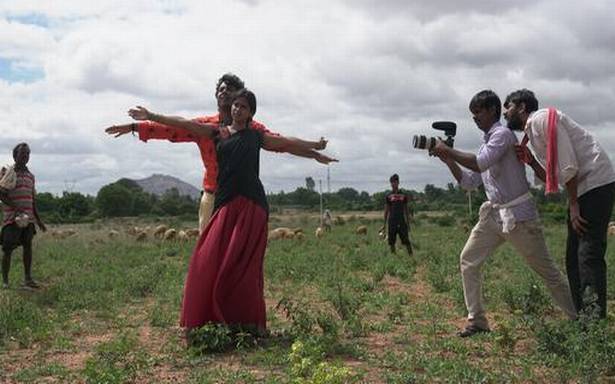Telugu film ‘Cinema Bandi’ is a charming narrative that explores how a high-end camera fuels dreams in a hamlet
‘Everyone is a filmmaker’, the makers of Cinema Bandi emphasise. Why not? Director Praveen Kandregula and writers Vasanth Maringanti and Krishna Pratyusha present an endearing story of a motley group of villagers who know nothing of the intricacies of filmmaking but give it their all to make a film.
The indie-spirited capture of the filmmaking process with the bare minimum facilities in the village is a nod to Faiza Ahmad Khan’s documentary Supermen of Malegaon (2012).
We are introduced to Veera (Vikas Vasistha) who goes about ferrying people in his shared auto, traversing bumpy lanes. The conversations are inevitably about the lack of rains and bad roads in the village, and the lure of the big city. Veera might be making just enough to make ends meet, but he is an optimist; he argues that if everyone migrates to the city, who will make things better for the village, and believes sincerely that there will be good tidings ahead. The film unravels in Gollapally village where the dialect is Telugu laced with Kannada. Cinema Bandi
- Cast: Vikas Vasistha, Rag Mayur, Sandeep Varanasi, Uma
- Direction: Praveen Kandregula
- Music: Sirish Satyavolu
- Streaming on: Netflix
Things take a turn when someone leaves behind a bag with a high-end camera in Veera’s vehicle. He takes a cue from a television channel report that Telugu films with smaller budgets can go on to be superhits. Thus begins a fun ride of ‘jugaad’ filmmaking.
Veera believes that the film could be a passport to better finances not only for himself but can also solve the infrastructure problems in his village.
Cinema Bandi is all heart, showcasing innocent vulnerability and big dreams. The village wedding photographer Ganapati (Sandeep Varanasi) turns cinematographer and the hairdresser Maridayya (Rag Mayur) turns hero with a screen name, Maridesh Babu!
The filmmaking process could have turned into a series of gags, but Praveen gently juxtaposes them with a closer look at the psyche of the characters. It takes a lot for the villagers, who mostly get by on daily earnings, to be a part of the film. There’s a superb scene where the fiery Manga (Uma) shuts up a naysayer by stating how she and those involved in the film have gone the extra mile in their daily lives to make the film shooting happen.
The women are varied and strong as they come. One heroine has her own plans of love and marriage. Another doesn’t like to be the damsel in distress; she’d rather take things into her control.
Interspersed with the filmmaking, there’s a lovely track between Veera and his wife Gangotri (Sirivennela Yanamadhala). She takes on additional responsibilities to keep the house running, and Veera quietly understands the weight of her burden. Gradually, Veera’s film becomes the village’s film as folks take pride in the project.
The urban-rural contrast is on expected lines, but nevertheless shows life as it exists on either side of the divide. Water is scarce in the village; a rain dance is the way a group of urban folks unwind…
The raw, rustic portrayal (cinematography by Apoorva Shaligram and Sagar) will leave you grinning and the film has its share of smaller heartwarming characters. A boy keeps a sharp eye on the ‘continuity’ required for the scenes and a grandfather (Muni Venkatappa), who is introduced as the writer for the story on which the film is based, sits without uttering a word.
If cinema can put the spotlight on people, places and ground reality, why can’t it fuel dreams in Gollapally village? Naive they may be but their dream isn’t far fetched.
(Cinema Bandi streams on Netflix)
Source: Read Full Article

